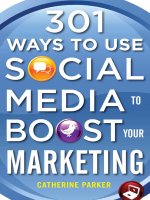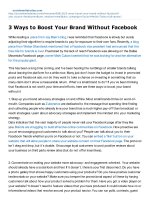20 PLUS BONUS TIPS101 ways to BOOST your business Practical tips to help your business survive docx
Bạn đang xem bản rút gọn của tài liệu. Xem và tải ngay bản đầy đủ của tài liệu tại đây (967.29 KB, 256 trang )
Practical tips to help your business
survive and prosper
PLUS
20
BONUS
TIPS
ANDREW GRIFFITHS
BOOST
your business
101 ways to
101
WAYS TO BOOST
YOUR BUSINESS
ALSO BY ANDREW GRIFFITHS
101 Ways to Market Your Business
101 Ways to Satisfy Your Customers
101 Ways to Advertise Your Business
Secrets to Building a Winning Business
COMING SOON
101 Ways to Balance Your Business and Your Life
101 Ways to Build a Network Marketing Business
101
WAYS TO
BOOST
YOUR
BUSINESS
ANDREW GRIFFITHS
First published in 2002 under the title 101 Survival Tips For Your Business
This revised edition published in 2006
Copyright © Andrew Griffiths 2006
All rights reserved. No part of this book may be reproduced or transmitted in any
form or by any means, electronic or mechanical, including photocopying, recording or by
any information storage and retrieval system, without prior permission in writing from
the publisher. The Australian Copyright Act 1968 (the Act) allows a maximum of one chapter
or 10 per cent of this book, whichever is the greater, to be photocopied by any educational
institution for its educational purposes provided that the educational institution (or body
that administers it) has given a remuneration notice to Copyright Agency Limited (CAL)
under the Act.
Allen & Unwin
83 Alexander Street
Crows Nest NSW 2065
Australia
Phone: (61 2) 8425 0100
Fax: (61 2) 9906 2218
Email:
Web: www.allenandunwin.com
National Library of Australia
Cataloguing-in-Publication entry:
Griffiths, Andrew, 1966– .
101 ways to boost your business.
ISBN 978 1 74175 006 5.
ISBN 1 74175 006 7.
1. Success in business – Handbooks, manuals. 2. Industrial
management – Handbooks, manuals, etc. I. Title.
658.155
Set in 12/14 pt Adobe Garamond by Midland Typesetters, Australia
Printed in Australia by McPherson’s Printing Group
10 9 8 7 6 5 4 3 2 1
Contents
Acknowledgments xi
Introduction xiii
Section 1: The future of small business 1
Section 2: Getting advice booster tips 6
#1 What type of help is available? 7
#2 Know when to look for help 9
#3 Embrace technology and save money 10
#4 You might be eligible for a grant 12
Section 3: Financial booster tips 14
#5 Don’t be undercapitalised—have enough
money from the start 16
#6 Budgets and planning—welcome to reality (plan
for the worst, not the best) 19
#7 Financing—it pays to shop around 22
#8 Keep your personal and business records
separate 24
#9 Find and use a good accountant 26
#10 What’s the difference between an accountant
and a financial planner? 28
#11 What to do if you get into financial trouble 30
#12 The real cost of expanding—can you afford it? 32
#13 Beware of giving credit 34
#14 Chasing bad debts—is it worth it? 36
v
#15 Keep good records from the start 38
#16 Keeping costs down without losing customers 39
#17 How to know what to charge 40
#18 Don’t invest your superannuation in a business
venture 42
#19 Beware the third-year boom and fourth-year bust 44
Section 4: Business relationship booster tips 46
#20 Partnership pitfalls—how to avoid them 47
#21 Build a relationship with your suppliers 49
#22 Build a relationship with your landlord 51
#23 Build a relationship with your professional
advisers 53
#24 Build a relationship with people in your industry 54
#25 Find a balance between work and home 55
#26 Use mediation to solve conflict 57
#27 Accept that others may not share your enthusiasm 59
Section 5: Staff booster tips 62
#28 Put the job description in writing 63
#29 Always check references 65
#30 A trial period protects both you and the new
employee 66
#31 Train your staff (and yourself) properly 67
#32 Lead by example and your team will follow 69
#33 Communicate effectively with your staff 70
#34 Conduct performance reviews 72
#35 Be conscious of security issues—protect your
business 74
#36 Dismiss staff who don’t work out 76
#37 Balance your staff numbers 78
Section 6: Customer service booster tips 80
#38 Build a relationship with your customers 81
#39 Learn to say ‘no’ 83
#40 Use simple market research to keep on track 85
101 WAYS TO BOOST YOUR BUSINESS
vi
#41 Continually ask your customers if they are happy 87
#42 Deliver what you promise—if you can’t do this,
get out of the game 89
#43 Be honest and upright in all your dealings 90
#44 The right and wrong way to handle a complaint 91
#45 Treat your customers with the respect that they
deserve 94
#46 Learn to recognise when you need a break from
your customers 95
Section 7: Advertising and marketing booster tips 97
#47 Develop your own marketing philosophy—
what type of business are you? 99
#48 Do a course or read a marketing book 100
#49 Take small steps to market your business 101
#50 Start with looking the part—develop a strong
corporate image 102
#51 Don’t be pressured into buying advertising 104
#52 Market your business to a simple plan 106
#53 Don’t lose touch with your customers 108
#54 Don’t stop marketing because business is
booming 110
#55 If you haven’t got the time to market your
business, find someone who has 111
#56 Talk to other people in business 112
#57 Find a business that you admire 113
Section 8: Internet booster tips 115
#58 Be realistic about the Internet 116
#59 A lousy website makes your business look lousy 119
#60 Make sure that you market your website 121
#61 The number one reason that businesses fail on
the Internet 122
#62 Budget for the Internet to be an ongoing expense 124
#63 Beware of spam 125
CONTENTS
vii
Section 9: Insurance booster tips 127
#64 What type of insurance should you have? 128
#65 How much insurance should you have? 129
#66 Always read the fine print 130
#67 Make sure that you meet your requirements
as per the policy schedule 132
#68 Using an insurance broker 133
#69 Don’t just sign the renewal policy—always
compare products and prices 135
#70 Prevention is better than cure 136
Section 10: Legal booster tips 138
#71 When to use a lawyer 139
#72 Choosing a lawyer 140
#73 Keeping legal costs down 141
#74 Make sure that everything is up-front 142
#75 Get a second opinion 143
#76 Even lawyers make mistakes—take control and
ask questions 144
#77 The real cost of taking someone to court—
is it worth it? 145
#78 Make sure that everything is in writing 147
Section 11: Personal booster tips 149
#79 Start your business feeling refreshed and healthy 151
#80 Don’t give up your hobbies when you start
your business 152
#81 Try to separate work from home 153
#82 Maintaining your enthusiasm 155
#83 Learn to laugh and lighten up 156
#84 Learn to handle stress 157
#85 Listen to your instincts—they are normally right 158
#86 Take regular holidays, even though there is never
a good time 160
#87 Develop your negotiating skills 162
101 WAYS TO BOOST YOUR BUSINESS
viii
#88 Be supportive of the community where you make
your living 164
#89 Use photographs to record your progress 165
#90 Know when to call it a day 166
#91 Break the habit of doing things the way they’ve
always been done 167
#92 Don’t be afraid to make changes (name,
location, etc.) 169
#93 Keep copies of important documents 171
Section 12: Planning for the future booster tips 174
#94 Know exactly where you are going 175
#95 Know exactly how you are going to get there 176
#96 Stay aware of, and up-to-date with, what is
happening in your industry 178
#97 Competition—you need to be better than the rest 180
#98 Always have a plan for when things go wrong 182
#99 Be aware of your business’s peaks and troughs 184
#100 Don’t just look at your business in terms of
facts and figures 186
#101 Set your business up so that someone will want
to buy it 188
Bonus section—20 more booster tips 191
#102 Don’t be afraid to charge what you’re worth 193
#103 Monopolies—the ultimate competition 195
#104 Learn to delegate 196
#105 Become a spokesperson 197
#106 Try to win an award for your business 198
#107 Don’t let a bad experience leave you feeling jaded 199
#108 Don’t lose a good customer over a few cents 201
#109 Enjoy the journey 203
#110 Constantly strive to boost your business 204
#111 Surround yourself with successful people 205
#112 Get to know your bank manager 206
#113 Make your business environmentally friendly 207
CONTENTS
ix
#114 Make your business a good place to work 209
#115 Learn to manage your time 210
#116 Don’t be afraid to be unconventional 211
#117 Read as much as you can 212
#118 Persevere, persevere, persevere 213
#119 Be open to ideas, suggestions and
recommendations 214
#120 Spend a few hours each week surfing the Internet 215
#121 Compile your own operations manual 216
Appendix: Blank forms that may come in handy 219
Credit request form (for your customers) 220
Goals and objectives form 222
Professional services checklist 224
Job description form (position description) 226
A checklist for employing staff 227
A step-by-step marketing plan 228
Insurance checklist 229
A stress checklist 230
A de-stress checklist 231
Developing an Internet plan 232
Recommended reading 233
About the author 234
101 WAYS TO BOOST YOUR BUSINESS
x
Acknowledgments
The information contained in this book is based on my obser-
vations of many successful businesses. I would like to express
my thanks to those individuals who have given me their
thoughts, views and suggestions.
I would also like to thank the team at Allen & Unwin who
have inspired me to keep writing. You are a dynamic team and
quite simply some of the most professional and supportive
people I have ever worked with. I consider myself very lucky to
be writing for such an impressive publishing company.
As with every project that I do, I have had enormous support
from my family and friends. Their words of encouragement
mean everything to me.
Finally, a special thank you to all the readers who have pur-
chased my books. I am constantly surprised by the number of
letters, faxes and emails that I receive from readers around the
world. To those people who take the time to pass on words of
appreciation, thank you very much. Your kind words mean a lot.
xi
In the daily course of my work as a marketing consultant I spend
a lot of time talking to successful business people. Without
exception, these individuals have a wealth of knowledge and
experience that they apply to their businesses and which makes
them successful. We often laugh about how much easier things
would have been if we could have applied what we know now to
our early business ventures, but most of us have had to learn the
hard way, which has often cost us a lot of money and heartache.
Over almost 20 years in business I have heard the same
comments time and time again. In recent years I have realised
that all businesses seem to experience the same basic problems
and that most of these problems could have been avoided with
the help of some simple, practical advice. Hence, I have written
this book.
My first book, 101 Ways to Market Your Business, was written
to help anyone who owns or operates a business to increase
profitability by introducing some very simple marketing ideas.
These ideas were developed around three key principles: that
people trying to promote a business often lack the time to
devote to marketing, lack the money to spend on marketing,
and lack basic marketing knowledge. The book was written
in very simple, jargon-free language, and the ideas suggested
produce very tangible results.
101 Ways to Boost Your Business follows the same principles.
It is written in short blocks that make it easy to find and
quickly read information that is practical, relevant and realistic.
xiii
It is not filled with hype, or with ideas that sound great but
prove impossible to implement.
By reading this book you will save yourself a lot of stress and
money. Most people in business have to learn what to do the
hard way. These mistakes may send them broke and cause
myriad associated health and family problems.
But this book is all about boosting your business. Today there
is no point simply surviving. If you were happy to do that you
would stay working for someone else. In reality, this book will
show you how to make your business so much better than your
competitors in every way. It will boost what you do and you will
reap the rewards. Now that is what every business owner wants
to hear.
Who is this book written for?
101 Ways to Boost Your Business is written for the person who
wants to make a difference. If you think you know everything
there is to know about business, you probably wouldn’t be
reading this book. If you are flicking through the pages because
you are keen to try and find ways to be better at what you do
and to increase your chances of building a booming business,
then you are looking in the right place.
101 Ways to Boost Your Business is written for anyone who has
a key role within a business. It is for managers, owners and oper-
ators, prospective business buyers, students studying business,
marketing managers, operations managers and professional
advisers. It crosses all boundaries and provides information
about issues that any person involved in business for any length
of time will encounter.
It is written in a way that makes it universally applicable. The
information contained in this book is as relevant to a bakery
owner in Belgium as it is to a bookshop owner in Brisbane. The
principles and tips discussed here are important to all busi-
nesses, regardless of their type or geographical location.
101 WAYS TO BOOST YOUR BUSINESS
xiv
The real value of
101 Ways to Boost Your
Business
As mentioned earlier, 101 Ways to Boost Your Business is a book
based entirely upon experience. Many of the experiences are
mine, a large number are those of people I have met and dealt
with over the years and some are a combination of both.
Many people take a lifetime in business to become aware of
these booster tips. I wish that I had had access to a book such
as this when I started my first business almost 20 years ago.
Hopefully, you will read 101 Ways to Boost Your Business and
avoid making the mistakes that I, and many other business
operators, have made. This book provides you with the oppor-
tunity to learn from the experiences of many successful business
operators and entrepreneurs, and to dramatically boost your
own chances of business survival and success.
The advice and suggestions included in this book have been
given freely by friends and business associates who, while suc-
cessful now, had to learn their lessons the hard way. For me, a
truly successful person is one who is willing to share the secrets
of their success with others, giving freely of their time and
advice and expecting nothing in return.
How to get the most out of this book
101 Ways to Boost Your Business has been written in such a way
that it can be opened at any page and the advice used immedi-
ately. There are a total of 121 booster tips included, covering the
areas that most commonly cause businesses to falter. Some of
the tips may not be relevant to you at this moment in time, but
if you pick up the book again in six months’ time, the tips that
you glossed over on your first reading may now be relevant. For
this reason, I recommend that you keep 101 Ways to Boost Your
Business handy. Don’t put it away at the top of your bookcase:
keep it in your briefcase, or in a drawer in your desk, or leave it
INTRODUCTION
xv
by the telephone or on your bedside table. Consider it as a
constant source of inspiration and advice that is available to
you 24 hours a day.
Some people avoid reading the preliminary sections of
books, preferring to get right into it. If that describes you, no
problem; just start flicking through the pages and see which
booster tips spark your interest. If you prefer to start at the
beginning and read every page, then make yourself a cup of
coffee, find a comfortable chair, and start reading.
This is a practical book that needs to be referred to often.
Cut out or photocopy the blank forms in the appendix to the
book and fill them in, highlight sections of the text that you
find relevant to your own situation, and write notes in the
spaces provided at the end of each section.
One last point before you get started
Throughout this book you are going to read the word ‘boost’ a
lot—pretty much on every page. To boost means to lift; to
raise; to generally improve. Without a doubt that is the message
behind this book. Every time you see the word ‘boost’, let it
sink in and remember that boost equates to making your busi-
ness better and that equates to success, profitability and an
overwhelming sense of satisfaction. Love that word.
101 WAYS TO BOOST YOUR BUSINESS
xvi
The future of small
business
Small businesses form the backbone of many economies. As
populations grow worldwide, so do the number of small busi-
nesses starting up. Millions of people around the world continue
to opt for running their own business instead of working for
larger organisations. As a result, there is an incredible knowledge
and skill base tied up in running these small businesses. There is
an enormous amount of expertise and specialist knowledge that
thrives in this economic sector, the value of which is often
underestimated.
From my experience, small businesses generally offer far
better levels of service than do their larger counterparts. This is
due, in most instances, to the key personnel being involved at
the front of the business. They deal with their customers face to
face, and the business is small enough to ensure that communi-
cation is open and continual.
There is no doubt that there are many trials and tribulations
when it comes to running your own business and, of course,
there is the ever-present risk of financial failure. However, this
doesn’t seem to deter people from choosing this alternative
career path, and for that I think they should be admired.
The problem facing most small businesses is the ever-
increasing competition from other small businesses. This dilemma
1
1
is here to stay; in fact, it will only increase. With the advent of
the Internet and other new technologies, the competition that
we all face now comes not only from the business up the road,
but from businesses on the other side of the world.
Small businesses need to be smart. They need to be built on
solid foundations and to be proactive. They need continually
to strive to provide exceptional levels of customer service and
value for money. Consumers are better informed and more
discerning than ever before, and are well aware that they have a
lot of choice when it comes to deciding on where they will
spend their hard-earned money.
Business survival is about facing these ongoing challenges
with a commitment to being the best at what you do. It is
about treating consumers with the respect that they deserve,
while standing out from the sea of other businesses that offer
the same or similar services.
It’s all about attitude
From my experience, there are two very distinct types of busi-
nesses and business operators.
There are those people who are really unhappy doing what
they do. Everyone else is to blame for the problems they experi-
ence. The customers are an inconvenience, and are always
causing problems. Advertising is just a waste of time and
money. The accountants are no good, the staff are nothing but
trouble, and the future always looks glum. These businesses
struggle to survive.
The other type of business that I have observed is run by
positive and enthusiastic people. They take what they do seri-
ously, they believe in offering excellent customer service and
value for money, and they are continually looking for ways
to make their business better. They don’t act like victims. If
they face a setback, as we all do from time to time, they pick
themselves up, dust themselves off and get on with it. They
101 WAYS TO BOOST YOUR BUSINESS
2
dwell on the positive, rather than the negative, aspects of the
situation. These businesses have a far better chance of surviving
and flourishing than the first type, due, I believe, to the attitude
of the business operator. From my experience, there are more of
the negative types of businesses than there are the positive ones.
So, the first step to boosting your business is to ensure that you
have the right attitude about running your business.
If you already own or operate a business . . .
People who have been running their own or someone else’s
business for a long time are often set in their ways. They may
have formed bad business habits and may regard ‘change’ as a
dirty word. I doubt that this describes you, because if it did, it’s
unlikely that you would have purchased this book.
The greatest personality trait that any business person can
have is an open mind. We live in an age where there is an over-
abundance of information, a lot of it conflicting. The fact is
that the amount of information available is only going to
increase, so we need to be able to use this wealth of information
for our own benefit.
Successful business people have two striking characteristics:
a very clear objective combined with an air of detachment
about their business. I have run a number of businesses that
were unprofitable because, while I had the clear objective, I
didn’t have the air of detachment. The clear objective gives you
the passion and the enthusiasm to keep going, but the detach-
ment stops the business from taking over your life. It enables
you to be somewhat clinical about what you are doing: if it’s
not working, let it go.
This book will provide you with direction and simple step-
by-step blocks of information that may direct your passion and
enthusiasm; however, learning to be detached is a much harder
skill to master. A business is just a business. There is life before,
during and after. If you are not enjoying, or worse still you hate,
THE FUTURE OF SMALL BUSINESS
3
what you are doing, maybe it’s time to cut your losses and make
a break. Detachment lets you do this.
If I had learned to let go at an earlier age, I would have saved
myself a lot of grief. Now I find it easy. If it’s not working and
I know that I have given it 100 per cent, I will simply cut my
losses and move on. There will be other business opportunities
that will come my way and, most importantly, I will have
learned a few new lessons.
The topics covered in this book
Based on my own experiences and those of the people I
have spoken to regarding their own business tips, 11 key
categories were developed for 101 Ways to Boost Your Business.
They cover all of the areas that virtually any business
will need to deal with at some stage in the history of their
organisation.
While some of the tips deal with very specific issues, such as
ensuring that you have enough money to run your business,
there are also more general tips on how to overcome the per-
sonal pressures and strains of running your own business. Each
type of booster tip is equally important. There are many ways
to determine whether or not a business is successful, and a
profit and loss statement is only one way.
The topics covered include:
• getting advice booster tips;
• financial booster tips;
• business relationship booster tips;
• staff booster tips;
• customer service booster tips;
• advertising and marketing booster tips;
• Internet booster tips;
• insurance booster tips;
• legal booster tips;
101 WAYS TO BOOST YOUR BUSINESS
4
• personal booster tips; and
• planning for the future booster tips.
The bonus section includes a further 20 booster tips that incor-
porate all of the above topics.
About the blank forms
The blank forms in the appendix at the back of 101 Ways to
Boost Your Business have been included to illustrate a number of
booster tips. They can be photocopied and reused as necessary.
Most are checklists that can be filed in the relevant places and
used as needed.
I have also included an outline of the information you need
to develop your own simple marketing plan. This may sound
like a complicated project, but in reality it is easy. Marketing
plans evolve and need to be updated on a regular basis, but
there is no doubt that having a simple marketing plan will be
of significant benefit to your business.
The blank forms include:
• a credit request form (for your customers);
• a goals and objectives form;
• a professional services checklist;
• a checklist for employing staff;
• a job description form (position description);
• a step-by-step marketing plan;
• an insurance summary page;
• a stress checklist;
• a de-stress checklist; and
• an outline for developing an Internet plan.
There is also space to write notes at the end of each section on
any action you need to take regarding specific booster tips.
THE FUTURE OF SMALL BUSINESS
5
Getting advice
booster tips
We all need help and advice at some stage in our business career.
Knowing when, and where, to get advice are the two main issues.
Both issues are outlined in this section, and a number of ideas are
suggested that could prove to be not only booster tips but also very
financially rewarding.
The ideas we’ll talk about in this section are:
#1 What type of help is available?
#2 Know when to look for help
#3 Embrace technology and save money
#4 You might be eligible for a grant
6
2
1
What type of help is available?
There are so many organisations available to assist business oper-
ators that it’s sometimes hard to know where to start looking.
There are various government-run organisations, as well as
many private enterprises, that offer thousands of products and
services that could be of benefit to you.
If you are planning on starting a business, do your homework
now. Find out about these organisations and exactly what ser-
vices they provide. Government-run organisations generally have
the distinct advantage of offering their products and services for
free or at fairly reasonable rates. Private enterprises tend to
charge a little more, but from my experience they generally
provide faster and more detailed services. This, of course, varies
from area to area, and I have worked with many government-
run organisations that are excellent. If you are not sure who to
use, talk to other business people.
If you already run your own business, it’s often very beneficial
to visit your local business advisory board to find out exactly
what services they offer. You may find that help is available
for exactly the kind of problems you are experiencing. One
thing is certain: whatever the problem you have, other busi-
nesses have had similar problems and somewhere there will be
help available.
I also like to utilise a network of business associates. If I am
experiencing a specific problem, I make a few calls to my circle
and ask for their advice; they do likewise. We all talk to each
other regularly, and we honour confidentiality when an associate
tells us about a problem that they are experiencing. This mutual
assistance works very well and can save you an enormous amount
of time and money.
Developing your own similar network can provide your
business with a free pool of experience that is on tap for you to
use whenever you need it. I think it is important to ensure that
there is an equal amount of information exchanged, other-
wise your associates may start to groan every time you call. If
GETTING ADVICE BOOSTER TIPS
7
someone gives me some great information that will save me
money or time, I like to send them a small gift and a note
expressing my thanks.
There are also excellent books available that include lists of
organisations and what services they provide. Talk to your local
bookstore and they can generally point you in the right direc-
tion. I use a reference book for writers that lists thousands of
companies and government organisations that offer various
products and services to writers.
Individual industries normally have their own associations
that are great sources of information. By being a member, you
will have access to information that would normally be hard to
find. The best thing about these organisations is that they
already know and understand your business, and the odds are
that your problems are shared by other businesses in the same
industry.
Of course, the Internet provides access to vast quantities of
information, and I recommend that you spend some time
searching for help online.
Finding out what type of help is available takes only time.
Increase your chances of boosting your business by being well
informed about who to turn to for help when you need it.
101 WAYS TO BOOST YOUR BUSINESS
8









